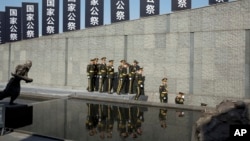Japan has paid its annual contribution for UNESCO after withholding the funds over the U.N. heritage body's decision to include documents on the 1937 Nanjing Massacre, its foreign minister said on Thursday, citing UNESCO reforms as the reason for the change of heart.
The bitter legacy of Japan's military aggression before and during World War II still haunts ties between Japan and China more than 70 years after the end of the conflict.
UNESCO last year had included a dossier on Nanjing submitted by Chinese organizations in the latest listing of its "Memory of the World" program, which is intended to preserve important historical materials.
Japan had said there were questions about the authenticity of the documents and called for improvements in the "fairness and transparency" of the Memory of the World program so that it would not be used for political purposes.
Japanese Foreign Minister Fumio Kishida told reporters that its payment of 3.85 billion yen ($32.7 million) had been made early this week.
"I think there has been major progress in work on reforming the (selection) system," he said, adding UNESCO helped promote friendship and mutual understanding among member nations.
Japanese media said Tokyo was worried that non-payment would hurt its global standing and weaken its clout in the U.N. body.
China had said there was nothing wrong with the documents or the application process and criticized Japan's withholding of funds.
China says Japanese troops killed 300,000 people in the massacre. A post-war Allied tribunal put the death toll at about half that number and some Japanese conservatives say that accounts of the massacre are a fabrication or exaggerated.
Sino-Japanese ties have also been frayed by territorial rows and mutual mistrust over China's growing military assertiveness, as well as Japan's bolder security stance.
The Chinese dossier, covering the period from Dec. 13, 1937 to early 1938, includes court documents from the Allied tribunal and a separate Chinese military tribunal, as well as photographs said to be taken by the Japanese army and film taken by an American missionary.
